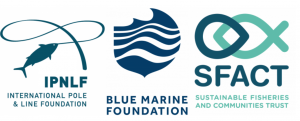The Sixth Special Session of the Indian Ocean Tuna Commission (IOTC) is an important opportunity to improve the management of fish aggregating devices for the sake of stocks and ecosystems. The Indian Ocean yellowfin tuna stock is currently overfished and has experienced overfishing since 2015. A substantial catch reduction of at least 30% from 2020 levels has been recommended to rebuild this stock by 2030. The region’s bigeye tuna stock is not faring much better, having recently been assessed as overfished and subject to overfishing, with the Harvest Control Rule (HCR) indicating a 15% reduction of catch is needed to rebuild this stock.
One of the key contributors to this situation is the lack of management of drifting fish aggregating devices (dFADs) which are deployed by European and other purse seiners to attract tuna before they deploy their massive nets around these man-made devices. A very high proportion of the yellowfin and bigeye tuna caught around these FADs are juveniles, impacting the overall condition of the stocks.
The use of dFADs also has a wide range of negative impacts on key ocean habitats and threatens other species such as sharks which fall victim to the bycatch dFAD fishing causes, or are mortally entangled in the netting attached to dFADs.
There is currently insufficient transparency in the use of dFADs which creates a lack of accountability for vessels deploying and utilising these fishing gears. This increases the risk of non-compliance with regulations, thereby potentially amplifying the negative impacts of dFADs and undermining conservation efforts. Data required by the IOTC since 2015, to inform improved dFAD management, has still not been submitted by some purse seine fleets to the IOTC seven years later. Last year Kenya highlighted a lack of compliance with various in place dFAD measures while IPNLF, Blue Marine Foundation and SFACT also noted at the last meeting of the IOTC Compliance Committee that would reduce dFADs’ contributions to dangerous marine pollution.
IPNLF, Blue Marine and SFACT urge the Commission to embrace the opportunity of this Special Session and endorse stronger, more effective and enforceable FAD measures to ensure the longevity of tuna fisheries, their associated livelihoods and to restore diverse ecosystems of the Indian Ocean. In particular, we are calling for greater transparency and stronger measures to reduce environmental and ecological damage and protect multiple important stocks from excessive juvenile harvests.
We support the proposal submitted to this meeting by twelve coastal states of the Indian Ocean which are greatly concerned about the damage being caused by dFADs.
The prevailing lack of transparency in dFAD use and data availability compromises monitoring of compliance with regulations and is detrimental, not only to tuna stocks, but also to broader marine ecosystems and the millions of livelihoods that depend upon the Indian Ocean for food and nutrition. To combat this issue, we are calling for the below actions at this meeting:
Environmental damage
Drifting FADs impact the wider environment and ecosystem through damage to marine habitats upon which the rest of the food chain depends. The netting attached to dFADs entangles many other marine species, including endangered species, which are not harvested and instead rot in the netting and increase the likelihood of other animals also becoming entangled. The submerged netting and ropes of dFADs entangle thousands, if not millions, of animals every year, while a study found that up to 960,000 silky sharks (mostly juveniles) may be entangled and killed annually by the submerged appendages of dFADs in the Indian Ocean alone. Plastic materials used in dFAD designs contribute to marine plastic pollution which is known to be harmful to ecosystems and all organisms, including humans. As such we call on the IOTC to:
Both yellowfin and bigeye tuna stocks are now overfished and subject to overfishing in the Indian Ocean. To rebuild these stocks, it is important that their reproductive potential is no longer compromised by excessive juvenile harvests. Drifting FADs pose a significant threat to these stocks’ reproductive potential and productivity; up to 97% of the yellowfin tuna and almost 100% of bigeye tuna harvested by industrial purse seine fleets around drifting FADs are juveniles. By preventing millions of tuna from reproducing before being harvested, dFAD fishing has severe impacts on both stocks’ productivity and upon the relative yield each fish provides for food security, nutrition and trade.
Ocean-wide dFAD closures are already in place in all other tuna regional fisheries management organisations (RFMOs), where they are proving to be effective tools in rebuilding stocks. For example, in the Atlantic Ocean, ICCAT Recommendation 21/01, which was originally endorsed in 2019, applied a 72-day dFAD closure which is considered an important contributor to halting the overfishing of bigeye tuna in that ocean. Noting the above concerns and encouraging global precedents, we call on the IOTC to:
If progress is not made in securing the sustainable management of dFADs in the Indian Ocean during this meeting, the IOTC may have no choice but to consider India’s proposal to implement a precautionary ban on dFAD use beyond 2023, as a means of enabling the long overdue recovery of valuable tuna stocks in this region. It is important for both the tuna stocks and the wider ecosystem that effective FAD measures are developed and, furthermore, are complied with. By implementing clearer, more transparent measures and systems like a dFAD register and proper FAD markings, repeat offenders may be better held to account for the damage they are causing, while we gain a better understanding of the impacts that dFADs have on tuna stocks and marine ecosystems.
